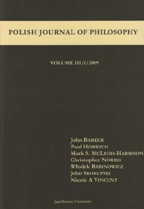Homesickness and Nomadism: Traveling with Kant and
Maimon
Homesickness and Nomadism: Traveling with Kant and
Maimon
Author(s): Ryan J. JohnsonSubject(s): History of Philosophy, Philosophical Traditions, Special Branches of Philosophy
Published by: Instytut Filozofii Uniwersytetu Jagiellońskiego
Keywords: homesickness; nomadism
Summary/Abstract: Solomon Maimon argues that while Kantianism does venture quite a way toward the establishment of an immanent critical project that more satisfyingly addresses real experience, it does not fulfill the aims of its own project. In order to negotiate Maimon’s claim, I utilize the primary metaphorics of the First Critique: homesickness. The Kantian longing for home is an insatiable yearning, a striving for the end of something that cannot end, namely, the end of the search for home (Zuhause). According to Maimon, although home is unattainable, there is a different sense of home: home is the path itself, a sort of nomadism, a roving life of the path that never leads home. The Kant of the first Critique did not fully realize that the project could not reach an actual final resting place; in fact, this realization, that home is a transcendental ideal, might be the very motivation for the third Critique. Thus, in order not merely to justify the possibility of synthetic a priori knowledge, but also to allow the application of such knowledge to reach the facts themselves, actuality as such, the “wellgroundedness” of the critical project requires some re-direction from Maimon. To do this, Maimon renders Kantian transcendental conditions truly genetic.
Journal: Polish Journal of Philosophy
- Issue Year: X/2016
- Issue No: 2
- Page Range: 45-69
- Page Count: 25
- Language: English
- Content File-PDF

